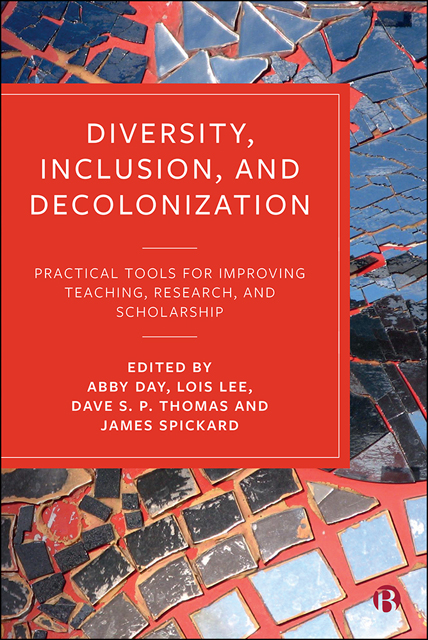 Diversity, Inclusion, and Decolonization
Diversity, Inclusion, and Decolonization Book contents
- Frontmatter
- Contents
- List of Figures and Tables
- Notes on Contributors
- Acknowledgements
- Typographical Note
- Introduction: Why Diversity, Inclusion, and Decolonization Matter
- Part I Changing Universities
- Part II Diversifying Curricula
- Part III Diversifying Research and Scholarship
- Part IV Overcoming Intellectual Colonialism
- Epilogue: What We Have Learned
- Index
Introduction: Why Diversity, Inclusion, and Decolonization Matter
Published online by Cambridge University Press: 13 October 2022
- Frontmatter
- Contents
- List of Figures and Tables
- Notes on Contributors
- Acknowledgements
- Typographical Note
- Introduction: Why Diversity, Inclusion, and Decolonization Matter
- Part I Changing Universities
- Part II Diversifying Curricula
- Part III Diversifying Research and Scholarship
- Part IV Overcoming Intellectual Colonialism
- Epilogue: What We Have Learned
- Index
Summary
We live in an increasingly diverse society. In person and in our media spaces, we encounter people from different racial and ethnic groups, of different genders and sexual orientations, with different religions, education levels, incomes, occupations, languages, marital and family statuses, age, physical and mental abilities, and geographic origins. And we interact with them. Our democratic and humanistic ideals call us to respect them and to treat them as we all wish to be treated.
At the same time, our core institutions remain dominated by a small elite, crudely equated to ‘White men of the Global North’ (see Ahmed, 2017). This elite offers a much narrower set of perspectives and interests than are found in our diverse populations. For universities, this means that people from a small set of identity categories still dominate the production and dissemination of academic knowledge in teaching, writing, and research. The dominance of such elites poses challenges to all supposedly democratic institutions. In academic life, it distorts the knowledge that universities produce; it ill-serves students, most acutely those from non-dominant groups; and it threatens the humanistic values on which the modern university is founded.
Euro-American universities have long seen themselves as keepers of the Western tradition: that (imagined) constellation of Enlightenment values that proclaimed itself to be humanity’s highest achievement and promised a ‘mission civilisatrice’ that would improve life around the world. Those values included equality, individual freedom, and the importance of the pursuit of truth. These were seen both as good in themselves and as pathways to social flourishing. That is why university scholars were given the freedom to teach, to write, and to learn: only by doing so could they discover the truths that are supposed to set us all free.
Ironically, though, the scholarly pursuit of truth has revealed large gaps between these universities’ values and their actual practices. Among other things:
• Universities do not treat people equally. Despite some progress, they continue to discriminate on the basis of gender, race, class, sexuality, religion, national origin, and a host of other attributes. They allow those with favoured status to join their student bodies and faculties; disfavoured groups are either admitted grudgingly or barred. This discrimination is often covert, but it is effective at keeping White male professional-class men – or people who act like them – at the top of the heap.
- Type
- Chapter
- Information
- Diversity, Inclusion, and DecolonizationPractical Tools for Improving Teaching, Research, and Scholarship, pp. 1 - 18Publisher: Bristol University PressPrint publication year: 2022
